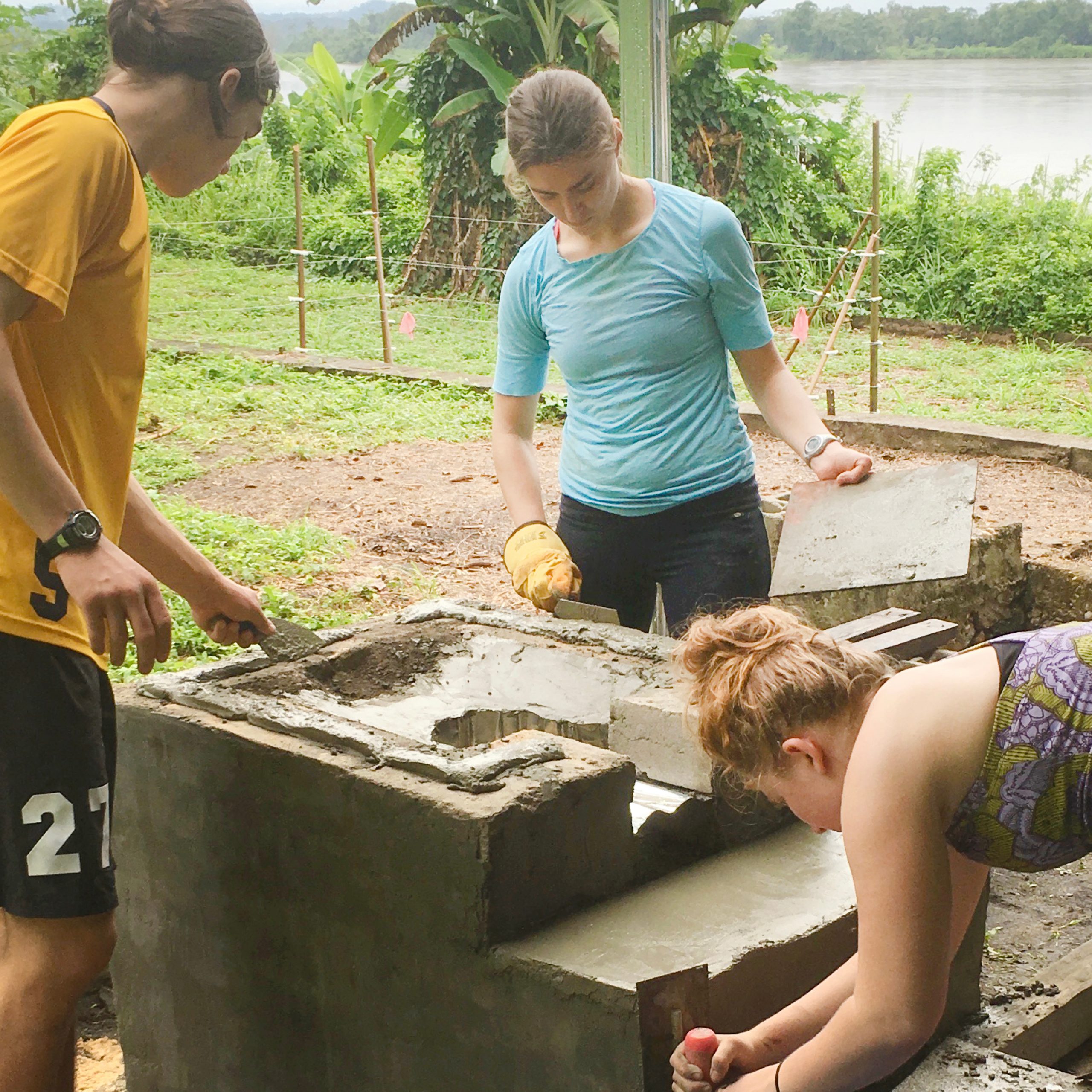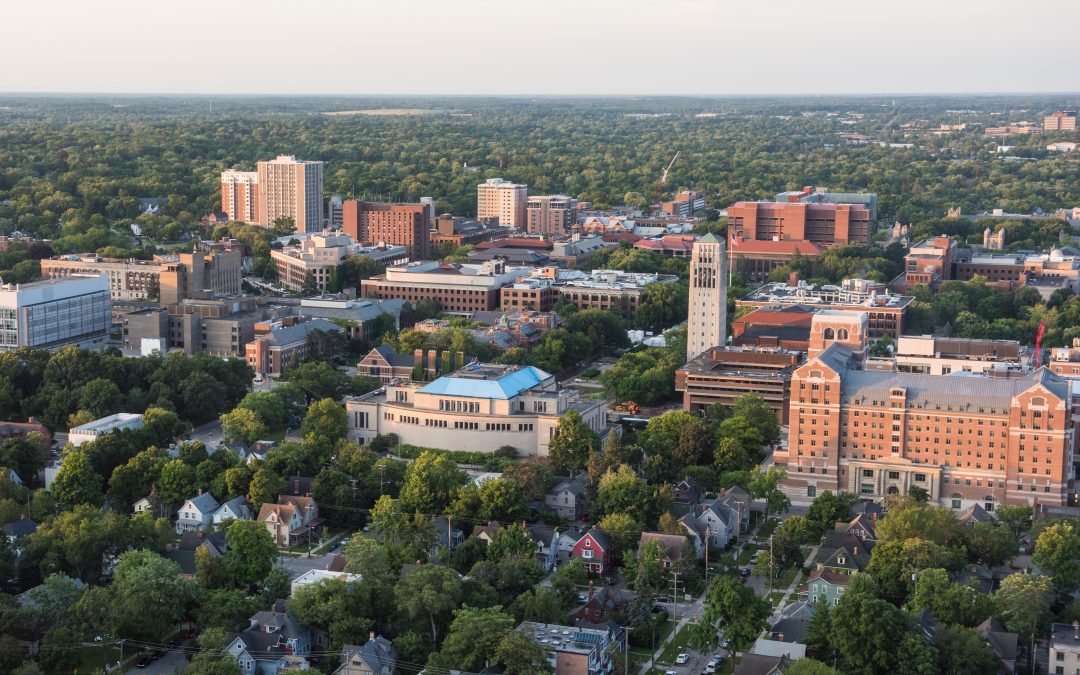Climate change threatens to alter virtually every aspect of life on Earth, from our food to our homes to the increasingly fragile ecosystems underlying it all. It’s a crisis that calls for an equally interconnected response, and while changes to government policies and institutional practices receive much of the public scrutiny, it’s one in which every community on the planet has a stake. Helping communities understand that, and develop practices that allow them to contribute to it, has formed the bedrock of recent U-M School of Nursing Ph.D. graduate Megan Czerwinski’s (B.S. ’15, Ph.D. ’20) academic career.
Early in her doctoral studies, Czerwinski was already sharing her knowledge and expertise with people around the world. After receiving undergraduate degrees from both nursing and the U-M Stamps School of Art and Design, she traveled to Gabon in Central Africa with Joseph Trumpey, an associate professor in Stamps, where she helped organize a sustainability workshop at a community hospital with both local villages and Gabonese faculty and students.
Her work on sustainability looked inward, as well. U.S. hospitals generate approximately five million tons of waste every year, according to the American Association of Medical Colleges, and the U.S. healthcare industry is responsible for an estimated 10 percent of the nation’s total greenhouse gas emissions. With pollution linked to around nine million premature deaths worldwide, these emissions represent not just a contribution to climate change, but a threat to the public health the industry is meant to preserve.
“My work examined how we’re preparing student nurses to problem solve for sustainability, because healthcare isn’t immune to sustainability challenges,” says Czerwinski, who completed her doctoral program on August 21. “Its waste stream circles back to create more public health problems. I wanted to look at what was being done about sustainability in nursing schools, and how it could be improved.”
Czerwinski discovered only a small existing body of work on teaching sustainability to nursing students, but that it was growing steadily in recent years. She wasted no time adding to it, either, piloting a multimedia case study in the School of Nursing community health course that revolved around the dioxane water contamination issues that have plagued west Ann Arbor since at least 1985. She intentionally chose a local issue for its relevance to the students in the class.
While the sample size was too small to register significant effects, Czerwinski did see a rise in the sustainability competency of students who attended the course sessions in which the case study was taught, as opposed to the control sessions in which it was not. The curriculum is now housed on Gala (www.learngala.com), an open access web platform created at the U-M School for Environment and Sustainability, where instructors can use it at any time.
“Our sample size was small, but based on what we observed, we’re hypothesizing that we would see significant improvements in how students understand sustainability if we were to apply it in a larger setting,” Czerwinski says. “Most of the students had never heard of Ann Arbor’s dioxane contamination problems before, so anecdotally we improved their awareness of environmental problems in the area.”

Czerwinski (center) helped organize sustainability workshops at a community hospital in Gabon.
Research into Action
On February 4, 2019, U-M President Mark Schlissel announced the President’s Commission on Carbon Neutrality, a university wide effort to reduce the U-M carbon footprint and contribute to the global fight against climate change. As the teams that would comprise the commission took shape, Czerwinski kept track of their evolving sustainability goals.
After attending one of the commission’s town hall events, Czerwinski reconnected with Trumpey, as well as with Samer Ali, an associate professor in the U-M Department of Middle East Studies, who were leading the Campus Culture and Communication team.
“After listening to them, I felt like they were going to do it justice and do their best to put forward meaningful recommendations to the commission,” Czerwinski says. “Their team also fit really well with my research. It’s an area that requires so much transformation—there’s a way to do a lot of good, but the moment calls for a lot of change on all of our parts.”
The Campus Culture and Communication team was established to help the wider campus community understand the importance of carbon neutrality, both as something U-M was striving toward and as something they could take with them and apply in their own lives and communities outside the university. Because while enacting policies at the university to curb emissions and balance its carbon footprint would achieve a technical goal, Czerwinski says that leaves much of the commission’s potential impact by the wayside.
“Something President Schlissel said early on, very truthfully I think, is that while just achieving carbon neutrality on the three U-M campuses is not nothing, it’s also not an enormous dent in carbon emissions worldwide,” Czerwinski says. “In order to amplify that effect, we need to make it a part of the culture of everything we do.”
By communicating the values of carbon neutrality in all aspects of the U-M campus community, Czerwinski says those values can then percolate out to the nearly half million U-M alumni, and through them continuing to spread beyond the university’s network into professions and disciplines worldwide.
The team split into two smaller groups, one focused on holding town hall events at the three U-M campuses—although the COVID-19 pandemic forced the UM-Flint event online—and the other, which Czerwinski joined, focused on environmental behavior.
The team envisioned a large-scale effort on the scale of those advancing diversity, equity, and inclusion. Czerwinski and her colleagues closely examined the DEI initiative at U-M, both its current state and how it unfolded in the past. As the effects of climate change weigh most heavily on vulnerable populations, the team also aimed to ensure that any sustainability work not only reaches every unit on campus, but is tightly linked to DEI endeavors, as well.
“This was one of the most urgent and meaningful things I did during my time at the University of Michigan,” Czerwinski says. “Research is a long game, and there’s not always a guarantee people will pick up and read your work—it’s usually many steps removed from real policy change. This was an opportunity to bring people together and lay the infrastructure to make change happen on campus, to put research into action.”
How Rackham Helps
Czerwinski received a Rackham Professional Development Grant that allowed her to attend Clean Med, a national conference put on by Healthcare Without Harm, which helped her gain a grounding in the field of healthcare sustainability. She also received a Rackham Conference Travel Grant to attend the annual conference of the North American Association for Environmental Education in Spokane, Washington, where she presented her literature review on sustainability education in nursing.

